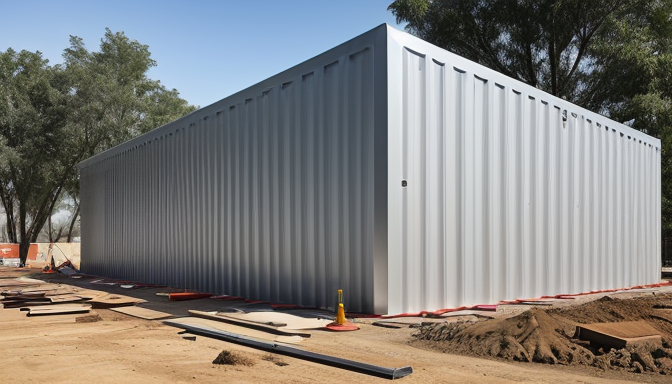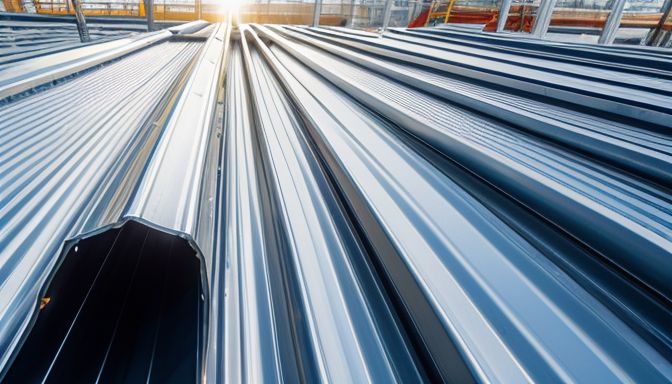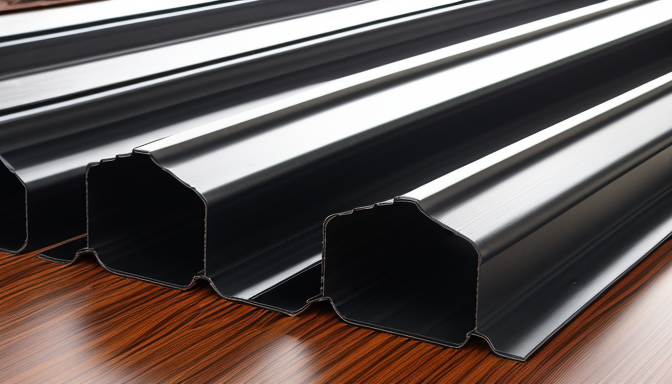When it comes to roofing, steel roofing sheets have become a popular choice for many homeowners and builders alike. Why? Well, they offer a unique blend of durability, affordability, and versatility. Imagine a roof that can withstand harsh weather, resist corrosion, and still look great. That’s the magic of steel roofing sheets. They’ve been around for a while, but their popularity has surged recently, and for good reason.
Steel roofing sheets are made from high-quality steel, which gives them their strength. They are often coated with protective layers to enhance their durability and lifespan. This means they can last for decades with minimal maintenance. Think of them as the superheroes of roofing materials—they stand strong against rain, snow, and even hail. Plus, they are lightweight compared to traditional roofing materials, making installation easier and less costly.
But let’s not forget about aesthetics. Steel roofing sheets come in various colors and styles. You can find options that mimic the look of traditional shingles or tiles, giving you the flexibility to choose a design that complements your home. It’s like dressing your house in a stylish outfit that also protects it from the elements.
In this article, we will dive deeper into the many aspects of steel roofing sheets. From understanding their price to their weight, and exploring their unique properties, we will cover it all. You’ll also learn about the different sizes available and the various applications where steel roofing sheets shine. By the end, you’ll have a comprehensive understanding of why these sheets are a fantastic choice for roofing.
So, are you ready to explore the world of steel roofing sheets? Let’s get started!
Steel Roofing Sheet Price
Understanding the pricing of steel roofing sheets is crucial for budgeting your projects. After all, no one wants to face unexpected costs that can throw a wrench in their plans. So, what exactly influences the price of these sheets? Well, it’s a mix of several factors, and knowing them can help you make informed choices.
First off, the quality of the material plays a significant role. Higher quality steel, which often has better resistance to rust and corrosion, tends to be more expensive. Think of it like buying a good pair of shoes. You can go for the cheap ones that might fall apart quickly, or you can invest in a sturdy pair that will last for years. The same logic applies here.
Another factor is market demand. Prices can fluctuate based on how many people are buying steel roofing sheets at any given time. If there’s a surge in demand, prices might go up. Conversely, during slower periods, you might find better deals. It’s a bit like waiting for a sale before buying your favorite gadget.
To give you a clearer idea, let’s take a look at some typical price ranges:
| Thickness (mm) | Price per Square Meter ($) |
|---|---|
| 0.3 | 2.50 |
| 0.4 | 3.00 |
| 0.5 | 3.50 |
| 0.6 | 4.00 |
These prices can vary based on location, supplier, and even the color of the roofing sheet. Yes, you read that right! Some colors may cost more due to the pigments used in the coating process. It’s like choosing between a plain t-shirt and one with a cool design; the latter usually comes with a higher price tag.
When budgeting for your project, don’t forget to include additional costs like installation and accessories. These can add up quickly. It’s wise to get quotes from multiple suppliers to ensure you’re getting the best deal. Just like shopping for groceries, a little comparison can save you a lot!
In summary, being aware of the factors that affect the price of steel roofing sheets will help you plan better. Whether you are building a new home or renovating an old one, understanding these costs can make the process smoother and more predictable. Remember, investing in quality can save you money in the long run!

Steel Roofing Sheet Weight
The weight of steel roofing sheets is an important consideration when planning any roofing project. Why? Because it can impact everything from installation to the structural integrity of the building. If you think about it, the roof is like the hat of a house. It needs to fit well and not be too heavy, or it might just tip over. Understanding the weight variations in steel roofing sheets helps you make smarter choices.
Typically, the weight of steel roofing sheets varies based on their thickness and dimensions. For instance, a standard sheet might weigh around 1.5 to 2.5 pounds per square foot. But don’t let that number fool you; the actual weight can fluctuate depending on the gauge of the steel. A thicker sheet might be more durable but also heavier. Here’s a quick breakdown:
| Gauge | Weight (lbs/sq ft) | Thickness (inches) |
|---|---|---|
| 26 | 1.5 | 0.0187 |
| 24 | 2.0 | 0.0224 |
| 22 | 2.5 | 0.0253 |
As you can see, as the gauge number decreases, the weight increases. This means that if you go for a 22-gauge sheet, you’ll get a sturdier roof, but it will also add more weight. This is crucial when considering the load-bearing capacity of your structure. If your house is older, you might need to reinforce the roof to handle the extra weight.
Moreover, the weight of the roofing sheets can affect installation. Heavier sheets may require more manpower or special equipment to lift and place. Imagine trying to lift a heavy box versus a light one. It’s a whole different ball game! So, if you’re planning to DIY, keep that in mind. You might want to consider hiring professionals if the sheets are on the heavier side.
In summary, when choosing steel roofing sheets, pay close attention to their weight. It’s not just a number; it’s a factor that can influence your entire project. Think about the long-term effects on your structure and installation process. After all, you want your roof to be both sturdy and functional!
Steel Roofing Sheet Properties
Steel roofing sheets are not just any roofing material; they are a blend of strength, durability, and efficiency. When you think about roofing, you want something that can stand the test of time. And that’s exactly what steel offers. But what makes these sheets so special? Let’s dive into their key properties.
First off, one of the standout features is their corrosion resistance. Steel roofing sheets are often coated with materials like zinc or a polymer finish. This coating acts like a protective shield, keeping moisture and rust at bay. Imagine walking through a rainstorm and staying completely dry. That’s the kind of protection steel roofing can provide your home.
Next, let’s talk about thermal performance. Steel reflects sunlight, which means it can help keep your home cooler during those hot summer months. It’s like wearing a light-colored shirt on a sunny day. By reflecting sunlight, steel roofing can reduce the need for air conditioning, saving you money on energy bills. How cool is that?
Another critical property is fire safety. Steel is a non-combustible material, which means it won’t catch fire easily. This is particularly important in areas prone to wildfires or where fire safety is a top concern. Think of it as having a fireproof blanket over your head. It provides peace of mind knowing your roof can withstand heat and flames better than many other materials.
In addition to these properties, steel roofing sheets are also incredibly lightweight. This means they put less stress on your building’s structure compared to heavier materials like tile or concrete. For builders, this can simplify the installation process. Less weight means less hassle. It’s like carrying a backpack that’s filled with feathers instead of rocks.
Moreover, steel roofing sheets are known for their longevity. With proper maintenance, they can last over 50 years. This durability means fewer replacements and repairs, which is a huge plus for homeowners. Think of it as investing in a sturdy pair of shoes that last through many adventures, rather than buying cheap ones that wear out quickly.
To sum it up, the properties of steel roofing sheets make them a fantastic choice for anyone looking to build or renovate. From corrosion resistance to fire safety, these sheets offer a range of benefits that can suit various needs. So, if you’re considering a new roof, steel might just be the way to go.

Steel Roofing Sheet Sizes
When it comes to steel roofing sheets, size matters. Choosing the right size can make or break your project. Think about it: a roof that doesn’t fit well can lead to leaks, inefficiencies, and even structural issues. So, how do you determine what size is right for you? Let’s dive into it.
Steel roofing sheets typically come in a variety of standard sizes. The most common widths are 26 inches and 36 inches, while lengths can vary significantly based on your specific needs. You might find sheets that are 8 feet, 10 feet, or even longer. But don’t just grab the first size you see! It’s crucial to consider the dimensions of your building, the pitch of your roof, and local building codes.
For instance, if you’re working on a residential project, you might prefer narrower sheets that allow for easier handling and installation. On the other hand, larger commercial buildings often benefit from wider sheets, which can reduce the number of seams and potential leak points. Here’s a quick rundown:
| Sheet Width | Common Lengths | Applications |
|---|---|---|
| 26 inches | 8, 10, 12 feet | Residential roofing |
| 36 inches | 10, 12, 14 feet | Commercial and industrial roofing |
Another important factor is the thickness of the sheets. Thicker sheets tend to be more durable and can withstand harsher weather conditions. Typical thicknesses range from 26 gauge to 22 gauge. The thicker the sheet, the more it can handle the elements. Just imagine a heavy storm—would you want a flimsy roof over your head? Probably not!
Now, how do you select the right size? Start by measuring your roof area. This will give you a clear idea of how many sheets you need. You can also consult with a roofing professional to ensure you’re making the best choice for your specific situation. Remember, it’s not just about the size; it’s about how well it fits into your overall project plan.
In summary, steel roofing sheets come in various sizes and thicknesses to meet different needs. By understanding the options available, you can make an informed decision that ensures your roof is not only functional but also long-lasting. Don’t underestimate the importance of getting the right size—after all, a good roof is your first line of defense against the elements!
Steel Roofing Sheet Applications
Steel roofing sheets are like the Swiss Army knife of construction materials. They’re versatile and can be used in a variety of settings. Whether you’re building a cozy home, a bustling commercial space, or a large industrial facility, steel roofing sheets have got you covered. But what exactly makes them so popular? Let’s dive into some of their key applications.
First off, in residential construction, steel roofing sheets are gaining traction. Homeowners love them for their durability and aesthetic appeal. Imagine a roof that can withstand heavy rain, wind, and even hail! Plus, they come in various colors and styles, allowing homeowners to pick something that complements their house. It’s like dressing your home in a stylish outfit that also protects it.
Moving on to commercial buildings, steel roofing sheets are a go-to choice for many businesses. They not only provide excellent protection but also help in reducing energy costs. How? Their reflective surfaces can bounce off sunlight, keeping the interiors cooler. This is especially beneficial in regions that experience intense heat. Think of it as a natural air conditioner for your building!
In the industrial sector, steel roofing sheets shine even brighter. Warehouses and factories often require robust roofing solutions. Steel sheets offer that strength. They’re resistant to corrosion and can handle the wear and tear of heavy machinery and equipment. This means less maintenance and more savings in the long run. It’s like having a reliable friend who always has your back.
Here’s a quick comparison to illustrate the different applications:
| Application | Benefits |
|---|---|
| Residential | Durability, aesthetic appeal, variety of styles |
| Commercial | Energy efficiency, cost savings, stylish options |
| Industrial | Strength, corrosion resistance, low maintenance |
Additionally, steel roofing sheets are often used in agricultural buildings. Think barns or storage facilities. They can handle the elements, keeping livestock and equipment safe and dry. It’s like having a protective shield against nature’s unpredictability.
In summary, the applications of steel roofing sheets are vast and varied. Their strength, durability, and aesthetic versatility make them a top choice in multiple sectors. Whether you’re planning a new build or a renovation, consider how these sheets can enhance your project. They’re not just roofs; they’re a solid investment in your property.
Frequently Asked Questions
- What are the main benefits of using steel roofing sheets?
Steel roofing sheets offer a multitude of advantages, including exceptional durability, resistance to harsh weather conditions, and low maintenance requirements. They are also eco-friendly, as steel is recyclable, making it a sustainable choice for roofing.
- How does the weight of steel roofing sheets affect installation?
The weight of steel roofing sheets can impact the structural integrity of the building. Lighter sheets are easier to handle and install, while heavier sheets may require additional support. It’s essential to consider the weight based on the thickness and dimensions of the sheets when planning your project.
- What factors influence the price of steel roofing sheets?
Several factors can affect the pricing of steel roofing sheets, including the quality of the material, market demand, and the thickness of the sheets. Additionally, any special coatings or finishes can also add to the overall cost, so it’s crucial to budget accordingly.
- What sizes do steel roofing sheets come in?
Steel roofing sheets are available in a variety of sizes to accommodate different architectural needs. Standard dimensions can range from 26 to 29 gauge, and lengths can vary based on the manufacturer. Selecting the right size is vital for ensuring a proper fit and optimal performance.
- Where are steel roofing sheets commonly used?
Steel roofing sheets are incredibly versatile and find applications in residential, commercial, and industrial settings. They are often used for warehouses, garages, and even homes due to their strength and adaptability to various designs.
- Are steel roofing sheets resistant to corrosion?
Yes! Most steel roofing sheets are treated with protective coatings that enhance their resistance to corrosion. This feature is crucial for maintaining their longevity, especially in areas with high humidity or rainfall.
